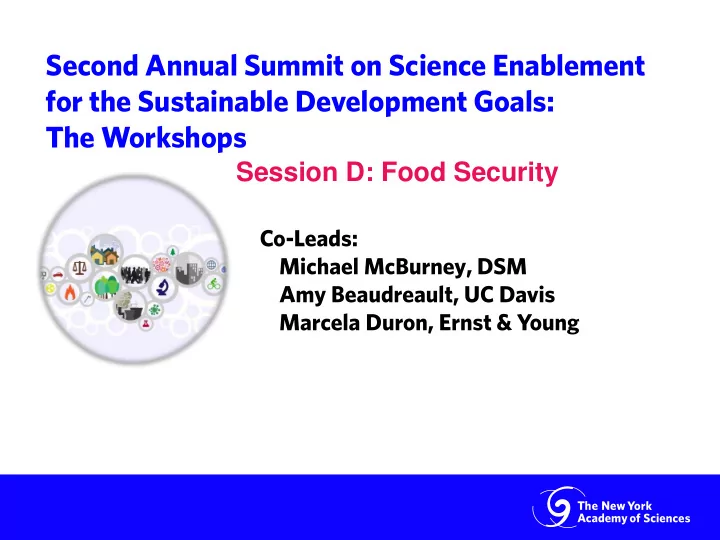

Co-Leads: Michael McBurney , DSM Amy Beaudreault , UC Davis Marcela Duron , Ernst & Young Second Annual Summit on Science Enablement for the Sustainable Development Goals: The Workshops Session D: Food Security
Food Security Consensus of Workshop • Definition of food security • Priorities topical areas focused on during workshop • Consensus of subtopics of importance • Research/Metrics gaps in research • Activities for researchers • Necessary resources • Key success metrics
Food Security: Definition and Priorities Definition: Food security exists when all people, at all times, have physical, social, and economic access to safe and nutritious food that meets their dietary needs and food preferences for an active and healthy life. (FAO) o Food systems food waste consumer/production lack of integrated approach nutrient-dense foods all times and optimal diet multi-sectorial collaboration access o Education/awareness/behavior change triple-burden: micronutrient deficiencies, obesity, under-nutrition culture-driven programs and education o Resiliency and emergency food system o diversified small-scale, local, and cultural food production preparedness infrastructure environmental: climate change, water supply, etc.
Food Security: Research and Metrics Needs Food systems o Food waste agriculture/production/consumers Integrate measurements in sustainable ag/production/consumption needed Measurement of costs and losses of value chain Does production meet consumer demand? Economic tools measuring food quality, production, and diet o Lack of integrated approach global view of research and metrics data-sharing across disciplines and sectors o Nutrient-dense foods all times and optimal diet nutrition through the lifecycle; e.g., tools specific for age groups o Multi-sectorial collaboration measure impact and capture learning guidelines for successful partnerships to increase transparency and trust o Access local communities data translation and dissemination of science outcomes access to scientific literature body of evidence to drive policy and regulation evaluation of policy and regulation using scientific methods
Food Security: Research and Metrics Needs Education/awareness/behavior change o Triple-burden: micronutrient deficiencies, obesity, under- nutrition Measurement of non-traditional indicators Non-food and – nutrition factors in dietary intake (nutrition-sensitive) o Culture-driven programs and education Lack of implementation research/evaluation Data on barriers to implement nutrition education How food/nutrition education can be integrated into school systems and food supply
Food Security: Research and Metrics Needs Resiliency & emergency food system o Diversified small-scale, local, and cultural food production Risk assessment o Preparedness infrastructure How to improve systems to prepare o Environmental: climate change, water supply, etc. Impact of dietary changes because of environmental impacts Food production’s effect on and by climate change Nutrient possible changes from environmental influences
Food Security: Key Activities for Science Technology & Innovation • Influence food innovation to focus on sustainability and nutrition in new products • Technologies effect on food systems (intended/unintended) • Alternative sources of protein and structuring, sweeteners, functional ingredients • Better understanding of technology and trust in science • Focus on behavior change utilizing research findings and develop technologies to better assess long-term behavior change Advocacy and Education • Provide evidence-based research and be an active participant in policy recommendations • Improve assessment tools to promote urgency of food/nutrition security and sustainable ag • Engagement with communication industry (media, associations, etc.) • Value all science research methodologies • Cross-disciplinary training in education Partnerships • Dialogue among diverse stakeholders (sector, discipline, geography) • Diversity in research funding, agenda setting
Food Security: Key Resources • MONEY from diverse funders at various levels of support • Education on the multi-faceted complexities to funders • External and internal organizational buy-in • Multi-sectorial engagement and representation in strategy development • Food/nutrition security ambassadors to draw attention to issue • Media to report science accurately
Food Security Roadmap: Key Success Metrics Key Points: • Decrease in chronic diseases • Lower rates of under-nutrition and micronutrient deficiencies • Impact of sustainability in food security: awareness, funding, public opinion change
Recommend
More recommend